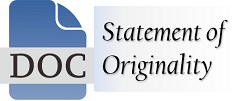Three Perspective Theory of Cyber Sovereignty dalam Strategi Keamanan Siber Singapura
DOI:
https://doi.org/10.31599/jki.v21i2.562Abstract
Abstract
The escalation of cyber threats in Singapore has prompted the country to intensify its cyberspace security protection. Singapore then implemented numerous strategies by collaborating across agencies and actors to obtain a protective cyberspace security system. This research aimed at figuring out Singapore Cyber Security Strategy (SCSS) documents comprehensively throughout textual analysis based on qualitative approach of an emerging-dominant elements in documents such as actor, instrument, politic, economy, research, and collaboration which were cooperated within actors. The author also fulfilled this analysis using qualitative approach to measure the data relation and the big picture of SCSS documents. Finally, the author found that Singapore’s strategy in applications and infrasctructure aspects, the government intervened them intensively. Singapore, one of the highest technological expertise countries in Southeast Asia, was fuflnerable getting the threats or attacks. So, this country was regulating an excellent cyber system and infrastructure to proctect their cyber management system secure. Meanwhile, Singapore’s policy in core aspects was a transfer due to the fact that Singapore was multi-ethnical and multi-culturalism country. Thus, Singapore’s strategy for ideological aspects was not regulated significantly in SCSS documents.
Keywords: Cyber Security Strategy, Data Relation, Sovereignty
Abstrak
Eskalasi ancaman terhadap ruang siber yang terjadi di Singapura telah mendorong negara tersebut untuk meningkatkan proteksi keamanan ruang sibernya. Singapura kemudian menerapkan berbagai strategi dengan cara menjalin kerjasama lintas instansi dan aktor untuk memperoleh sistem keamanan ruang siber yang lebih protektif. Tulisan ini bermaksud untuk memahami dokumen Singapore Cyber Security Strategy (SCSS) secara komprehensif dengan melakukan analisis kontekstual berdasarkan pendekatan kualitatif terhadap sejumlah unsur yang dominan muncul di dalam dokumen seperti aktor, instrument, politik, ekonomi, penelitian, dan kolaborasi yang dibangun di antara para aktor. Penulis juga melengkapi analisis ini dengan pendekatan kuantitatif untuk mengukur relasi data dan kecenderungan yang tergambar dari dokumen SCSS tersebut. Hasilnya, penulis menemukan bahwa pada level strategi di sektor application dan infrastruktur, pemerintah Singapura memiliki intervensi penuh dalam mengatur seluruh aktivitas di kedua aspek tersebut. Sebagai salah satu negara yang cukup signifikan di dalam pengelolaan teknologinya di kawasan Asia Tenggara, maka Singapura secara eksklusif berupaya membangun sistem dan infrastruktur siber yang mumpuni untuk melindungi tata kelola ruang siber mereka dari berbagai ancaman. Berbeda pada aspek core yang bersifat lebih terbuka (transfer) lantaran banyak dipengaruhi oleh multietnis dan multikulturalisme. Sehingga proteksi terhadap hal-hal yang bersifat ideologis tidak banyak diatur di dalam dokumen SCSS.
Kata kunci: Kedaulatan, Relasi Data, Strategi Keamanan Siber
Downloads
References
Authority, I. M. D. (2005). Three-year Infocomm Security Masterplan Unveiled. Infocomm Media Development Authority.
Disputes, T., & Cyber, O. (n.d.). A Three-Perspective Theory (Issue 2).
Hughes, B. B., Bohl, D., Irfan, M., Margolese-Malin, E., & Solórzano, J. R. (2017). ICT/Cyber benefits and costs: Reconciling competing perspectives on the current and future balance. Technological Forecasting and Social Change, 115, 117–130. https://doi.org/10.1016/j.techfore.2016.09.027
International Telecommunication Union. (2017). Global Cybersecurity Index (GCI) 2017. In ITU-D Global. https://www.itu.int/dms_pub/itu-d/opb/str/D-STR-GCI.01-2017-PDF-E.pdf
Martin, W. (2008). Singapore’s Cybersecurity Strategy. Southern Crossroads: Perspectives on Religion and Culture, 63–88. https://doi.org/10.4324/9780203462010-8
Nations, U. (2012). * The views expressed in this paper are those of the authors and do not necessarily represent those of the United Nations. September, 1–9.












_-_Copy1.jpg)




